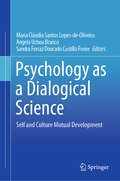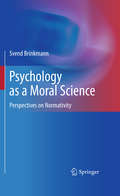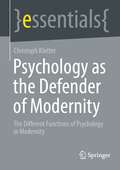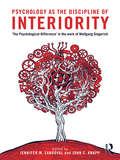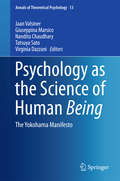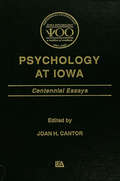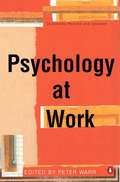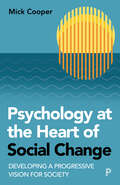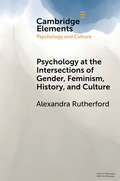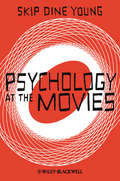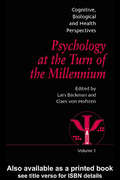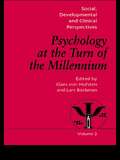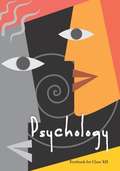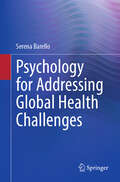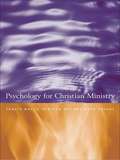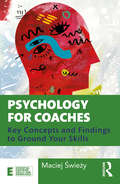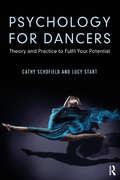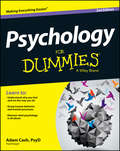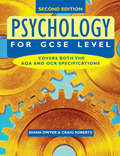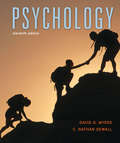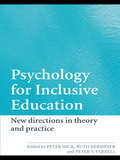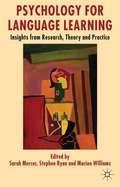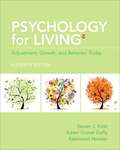- Table View
- List View
Psychology as a Dialogical Science: Self and Culture Mutual Development
by Angela Uchoa Branco Maria Cláudia Santos Lopes-de-Oliveira Sandra Ferraz Dourado Castillo FreireThis book intends to translate into theoretical, methodological and practical language the principles of dialogical psychology. Throughout the 19th and 20th centuries, theoretical models in psychology have approached human mind and behavior from a monological point of view, a generalizing perspective which ignored the core role of social transactions in the construction of the person and sought to explain psychological functioning only looking inside individuals’ minds and brains, or in mechanist sets of reinforcement contingencies. However, for the last 40 years, critical perspectives within the fields of psychological and sociological theoretical thinking have produced an important epistemological shift towards a new dialogical paradigm within the behavioral and social sciences. The contributions in this volume intend to present both the theoretical framework and possible applications of dialogical psychology in different fields of research and practice, such as:Developmental psychologySchool and educational psychologySocial and personality psychologyEducationSocial workAnthropologyArt Psychology as a Dialogical Science - Self and Culture Mutual Development will be an invaluable resource to both researchers and practitioners working in the different areas involved in the study and promotion of healthy human development by providing an alternative scientific framework to help overcome the traditional, reductionist, monological explanations of psychological phenomena.
Psychology as a Moral Science
by Svend BrinkmannWhat does morality have to do with psychology in a value-neutral, postmodern world? According to a provocative new book, everything. Taking exception with current ideas in the mainstream (including cultural, evolutionary, and neuropsychology) as straying from the discipline's ethical foundations, Psychology as a Moral Science argues that psychological phenomena are inherently moral, and that psychology, as prescriptive and interventive practice, reflects specific moral principles. The book cites normative moral standards, as far back as Aristotle, that give human thoughts, feelings, and actions meaning, and posits psychology as one of the critical methods of organizing normative values in society; at the same time it carefully notes the discipline's history of being sidetracked by overemphasis on theoretical constructs and physical causes--what the author terms "the psychologizing of morality." This synthesis of ideas brings an essential unity to what can sometimes appear as a fragmented area of inquiry at odds with itself. The book's "interpretive-pragmatic approach": * Revisits core psychological concepts as supporting normative value systems. * Traces how psychology has shaped society's view of morality. * Confronts the "naturalistic fallacy" in contemporary psychology. * Explains why moral science need not be separated from social science. * Addresses challenges and critiques to the author's work from both formalist and relativist theories of morality. With its bold call to reason, Psychology as a Moral Science contains enough controversial ideas to spark great interest among researchers and scholars in psychology and the philosophy of science.
Psychology as the Defender of Modernity: The Different Functions of Psychology in Modernity (essentials)
by Christoph KlotterPeople in Germany have an indifferent to poor relationship with our society. In fact, modernity, i.e. the last 200 years, has given the population historically unprecedented progress: democracy, human rights, social security systems, nutritive abundance. Yet this is little appreciated. This may be due to the fact that, in Diderot's sense, we have to prove ourselves permanently, that is, we live in a meritocracy that produces suffering. However, totalitarian ideologies have also emerged and been implemented in modernity, for which modernity is also responsible. This essential shows that psychology, on closer inspection, turns out to be the defender of the good parts of modernity.
Psychology as the Discipline of Interiority: "The Psychological Difference" in the Work of Wolfgang Giegerich
by Jennifer M. Sandoval John C. KnappPsychology as the Discipline of Interiority is the first collection of essays dedicated to the study and application of Psychology as the Discipline of Interiority—a new ‘wave’ within Analytical Psychology which pushes off from the work of C. G. Jung and James Hillman. The book reflects upon the notion of psychology developed by German psychoanalyst Wolfgang Giegerich, whose Hegelian turn sheds light on the notion of soul, or psyche, and its inner logic and ‘thought’, forming a radical new basis from which to ground a modern psychology with soul. The book’s theme - ‘the psychological difference’ - is applied to topics including analytical theory, clinical practice, and contemporary issues, ranging from C. G. Jung’s Mysterium, to case studies, to the nuclear bomb and the Shoah. Psychology as the Discipline of Interiority expounds upon the complexity, depth, and innovativeness of Giegerich’s thought, reflecting the various ways in which international scholars have creatively explored a speculative psychology founded upon the notion of soul. The contributors here include clinical psychologists, Jungian analysts, and international scholars. With a new chapter by Wolfgang Giegerich and a foreword by David Miller, Psychology as the Discipline of Interiority will be essential reading for depth and clinical psychologists, Jungian psychoanalysts in practice and in training, and academics and students of post-Jungian studies. It is also relevant reading for all those interested in the history of philosophical thought and what it means to think in the highly sophisticated and technological world of the twenty-first century.
Psychology as the Science of Human Being
by Nandita Chaudhary Jaan Valsiner Giuseppina Marsico Tatsuya Sato Virginia DazzaniThis book brings together a group of scholars from around the world who view psychology as the science of human ways of being. Being refers to the process of existing - through construction of the human world - here, rather than to an ontological state. This collection includes work that has the goal to establish the newly developed area of cultural psychology as the science of specifically human ways of existence. It comes as a next step after the "behaviorist turn" that has dominated psychology over most of the 20th century, and like its successor in the form of "cognitivism", kept psychology away from addressing issues of specifically human ways of relating with their worlds. Such linking takes place through intentional human actions: through the creation of complex tools for living, entertainment, and work. Human beings construct tools to make other tools. Human beings invent religious systems, notions of economic rationality and legal systems; they enter into aesthetic enjoyment of various aspects of life in art, music, and literature; they have the capability of inventing national identities that can be summoned to legitimate one's killing of one's neighbors or being killed oneself. The contributions to this volume focus on the central goal of demonstrating that psychology as a science needs to start from the phenomena of higher psychological functions and then look at how their lower counterparts are re-organized from above. That kind of investigation is inevitably interdisciplinary - it links psychology with anthropology, philosophy, sociology, history and developmental biology. Various contributions to this volume are based on the work of Lev Vygotsky, George Herbert Mead, Henri Bergson and on traditions of Ganzheitspsychologie and Gestalt psychology. Psychology as the Science of Human Being is a valuable resource to psychologists, sociologists, philosophers, biologists and anthropologists alike.
Psychology at Iowa: Centennial Essays
by Joan H. CantorAfter tracing the history of psychology at Iowa, the contributors reflect on the institution's leadership role in the development of the discipline, describe its long tradition of significant theoretical and empirical contributions to major areas in the field, and profile some of its most important intellectual leaders.
Psychology at Work
by Dr Peter B WarrApplied psychology in work settings has made considerable progress in the 30 years since the original version of this book was published. This new collection of essays aims to illustrate both the empirical and practical richness of the field as wellas its theoretical development. The chapters cover psychological processes, the study of groups and workteams, and the nature of complex organizations as a whole. Reflecting recent developments in psychology as well as society generally, topics range from skill and workload, shiftwork, personnel selection, training and careers, and the effects of new technology, leadership and management, to job stress and well-being, women in employment, corporate culture and processes of organizational change.
Psychology at the Heart of Social Change: Developing a Progressive Vision for Society
by Mick CooperWe live in troubled times: climate crisis, war and authoritarian ‘populism’ are just some of the challenges we are currently facing. Never has there been such a need for a new approach to politics – nor such an opportunity for one. To create a world in which people thrive, we need to know what thriving is. Over the past century, psychotherapy – and its parent discipline, psychology – has built up a vibrant, nuanced and highly practical understanding of human wellbeing and distress. This book describes a progressive political approach that integrates insights from the psychotherapeutic and psychological domain, moving us from a politics of blame to a politics of understanding. In this vision of society – surrounded by a culture of radical acceptance – all individuals can live rich and fulfilling lives. We need those shaping our political landscape to understand psychological needs and processes more deeply to enhance our ability to work with others in a spirit of collaboration, dialogue and respect.
Psychology at the Intersections of Gender, Feminism, History, and Culture (Elements in Psychology and Culture)
by Alexandra RutherfordPsychologies of women and gender have developed - both institutionally and intellectually - within distinct social, cultural, historical, and political contexts. In many cases, feminism has played an important role in catalyzing disciplinary engagements with gender and culture as categories of analysis and sites of theorizing rather than solely as variables defining groups to be compared. The intersections of gender, feminism, history, and culture are explored with reference to psychology, first in the United States, and then across three other national contexts. This exploration reveals the similarities and tensions between and among the approaches to studying culture and the approaches to studying gender, that psychologists have employed. It also reveals the historically - and culturally - contingent nature of psychologies of women and gender, and, by extension, of gender itself.
Psychology at the Movies
by Skip Dine YoungPsychology at the Movies explores the insights to be gained by applying various psychological lenses to popular films including cinematic depictions of human behavior, the psychology of filmmakers, and the impact of viewing movies.Uses the widest range of psychological approaches to explore movies, the people who make them, and the people who watch them Written in an accessible style with vivid examples from a diverse group of popular films, such as The Silence of the Lambs, The Wizard of Oz, Star Wars, Taxi Driver, Good Will Hunting, and A Beautiful MindBrings together psychology, film studies, mass communication, and cultural studies to provide an interdisciplinary perspectiveFeatures an extensive bibliography for further exploration of various research fields
Psychology at the Turn of the Millennium, Volume 1: Cognitive, Biological and Health Perspectives
by Claes Von Hofsten Lars BThese two volumes represent the cutting edge of contemporary theory and research in psychological science. Based on the keynote and state-of-the-art lectures from the 27th International Congress of Psychology, the volumes feature a collection of chapters written by international leaders in psychological scholarship. The chapters reflect the diversity of current research topics in psychology, where old boundaries have become obsolete and subdivisions from the past merge to form new objects of study. Volume 1 addresses cognitive, biological, and health perspectives. It includes sections on the neural mechanisms underlying psychological processes; the core areas in experimental psychology, perception, attention, learning, and memory; the multiple aspects of psychological health; the interaction between cognitive and emotional processes; and higher cognitive processes with special focus on decision-making and language. Volume 2 deals with social, developmental, and clinical perspectives. The sections highlight human development across the life span; basic and applied issues in personality, emotion, and clinical psychology; social psychology, ranging from experimental work through social constructivism; and gender.
Psychology at the Turn of the Millennium, Volume 2: Social, Developmental and Clinical Perspectives
by Lars Bäckman Claes Von HofstenThese two volumes represent the cutting edge of contemporary theory and research in psychological science. Based on the keynote and state-of-the-art lectures from the 27th International Congress of Psychology, the volumes feature a collection of chapters written by international leaders in psychological scholarship. The chapters reflect the diversity of current research topics in psychology, where old boundaries have become obsolete and subdivisions from the past merge to form new objects of study. Volume 1 addresses cognitive, biological, and health perspectives. It includes sections on the neural mechanisms underlying psychological processes; the core areas in experimental psychology, perception, attention, learning, and memory; the multiple aspects of psychological health; the interaction between cognitive and emotional processes; and higher cognitive processes with special focus on decision-making and language. Volume 2 deals with social, developmental, and clinical perspectives. The sections highlight human development across the life span; basic and applied issues in personality, emotion, and clinical psychology; social psychology, ranging from experimental work through social constructivism; and gender.
Psychology class 11 - GSTB - 23
by Gujarat State Board of School Textbooks"Psychology" is a concise and informative textbook designed for class 11 students following the GSTB curriculum. This book provides a comprehensive introduction to the intriguing field of psychology, enabling students to grasp the intricacies of human behavior. Covering essential topics, the textbook includes chapters on the history and scope of psychology, research methods, biological influences, sensation and perception, learning and memory, intelligence and cognition, as well as motivation and emotion. Through a combination of engaging content and clear explanations, this textbook serves as an invaluable resource, fostering students' understanding of human behavior and sparking their curiosity for further exploration in the field of psychology.
Psychology class 11 - NCERT - 23
by National Council of Educational Research and TrainingThe Introduction to Psychology textbook, designed for Class 11 students following the NCERT curriculum, provides a comprehensive introduction to the field of psychology. It covers key concepts, theories, and research methods used in psychological inquiry. The textbook begins by explaining psychology as a scientific discipline, exploring its historical perspectives, major schools of thought, and the overall goals and scope of the field. It emphasizes the scientific approach and experimental design, along with data collection techniques and statistical analysis commonly used in psychological research. The bases of human behavior are explored, including the role of the nervous system, genetics, and environmental influences. This section examines the intricate interplay between biology and behavior, offering insights into how various factors shape human actions and experiences. The textbook aims to develop students' understanding of psychology, foster critical thinking skills, and provide a solid foundation for further exploration and study in the field. By studying psychology, students gain valuable insights into human behavior and the scientific study of the mind.
Psychology class 12 - NCERT - 23
by National Council of Educational Research and TrainingThis textbook has been prepared to introduce the fundamentals of psychology. Besides providing basic disciplinary knowledge, it focuses on enhancing the curiosity and understanding of people’s behaviour and that of one’s own. This textbook consists of seven chapters on topics considered essential for an introductory course in psychology.
Psychology for Addressing Global Health Challenges
by Serena BarelloPsychology for Addressing Global Health Challenges is conceived as a pioneering volume that delves into the nexus between psychology and the paramount global health challenges of our era. With a deep focus on the Sustainable Development Goals (SDGs), this book is strategically crafted to empower psychologists, researchers, health practitioners, health managers and policy makers with the knowledge and tools essential for addressing pressing health issues on a global scale. By concentrating on the unique interplay between psychological factors and the health landscape, the volume seeks to equip students and professionals with actionable insights and evidence-based psychologically-rooted strategies for designing effective and human-centered interventions, and interdisciplinary insights to promote a systems-thinking approach to global health challenges. The primary objective is to harness the power of psychological science to foster positive behavioural change and sustainable practices, ultimately contributing to the advancement of a more equitable and sustainable world.
Psychology for Christian Ministry
by Fraser Watts Rebecca Nye Sara SavageThis introduction to psychology has been devised for those training for and working in the clergy. Ideal both as a professional handbook and a textbook, it covers social, developmental, educational, occupational and counselling psychology, as well as the psychology of religion. It carefully considers the processes of personal change and growth central to religion.
Psychology for Coaches: Key Concepts and Findings to Ground Your Skills (Essential Coaching Skills and Knowledge)
by Maciej ŚwieżyPsychology for Coaches offers its readers a chance to ground their interpersonal skills in sound psychological theory and research. It provides a solid synthesis of current concepts and research results, translating them into hands-on recommendations and examples of tools. The book was written in response to questions asked by trainee coaches eager to make sure they are doing their best to provide a safe, professional, and valuable service. It offers clear, practical examples on how to apply presented concepts into coaching practice. It challenges popular strategies that may have unwanted side effects and offers to replace them with specific ideas on how to use coaching conversations to: support goal setting and consistent motivation encourage autonomy and responsibility assist self-reflection and manage learning increase awareness of emotions and manage them better identify and change beliefs and schemas build a healthier perception of oneself Psychology for Coaches will be essential reading for coaches in all areas, including those in training, who want an accessible, fast introduction to the most relevant areas of psychology and an overview that will guide their further learning. It will also be an inspirational guide for people aiming to use coaching skills in other professional roles.
Psychology for Dancers: Theory and Practice to Fulfil Your Potential
by Cathy Schofield Lucy StartPsychology for Dancers: Theory and Practice to Fulfil Your Potential examines how psychological theory can be related to dance practice. Aimed at the dancer who wants to maximize their potential but has no grounding in psychology, the book begins with an examination of basic psychological concepts, approaches and methods, before applying theory to dance. The book explores why dance is so important in many people’s lives: as a form of fitness, a profession, or visual entertainment. Each chapter then examines a different aspect of psychology related to dance in an applied context. Self-perception is examined as dancers are under great scrutiny; a grounded sense of self will ensure a positive perception of self-worth and body image, and suggestions are made as to how a healthy and motivational climate can be created. The book also places an emphasis on how cognitive skills are as important as technical skills, including the ability to learn and recall steps and choreography as efficiently as possible. Social factors are related to the dance context, with a discussion of effective leadership and communication skills and the importance of group cohesion. Finally, there is a review of the impact of emotions on dance practice and how best to manage these emotions. Each chapter reviews important psychological theories, offering practical suggestions on how they can be applied to dance practice. Psychology for Dancers is an invaluable resource for students, professionals, and teachers of dance.
Psychology for GCSE Level (500 Tips)
by Craig Roberts Diana DwyerWritten by two experienced psychology teachers and examiners, this textbook provides thorough coverage of both the AQA and OCR GCSE Psychology specifications. The user-friendly layout clearly identifies which sections are pertinent to each specification. The book is produced in attractive full colour with plenty of photographs, pictures and cartoons, and provides a variety of student-friendly features, including: A list of the AQA and/or OCR specification requirements for each topic An everyday-life case study to introduce each chapter Numerous classroom activities Key terms highlighted and defined throughout the text Aims and Learning Outcomes, which highlight the general themes and processes (including why psychology matters, how psychology works, everyday life, ethical issues, diversity, critical thinking and methodology) Research studies with evaluations Clear and concise chapter summaries Exam hints and tips Exam-style questions. This new edition is accompanied by a set of online multimedia resources, including powerpoint lecture courses and multiple-choice questions tests, available free-of-charge to schools who adopt this book as their text.
Psychology for High School
by David G. Myers C. Nathan DeWallTeaching psychological science through writing and interactive media, Psychology for High School takes an integrated approach so that after you read a chapter, you move into working online, getting to put yourself into the role of scientific researcher.
Psychology for Inclusive Education: New Directions in Theory and Practice
by Ruth Kershner Peter Hick Peter T. FarrellWhat can psychology offer inclusive education? Traditionally, special education has looked to psychology for many of its theoretical resources and practical strategies. While those seeking to promote more inclusive education have tended to see psychology and psychologists as part of the problem by providing a rationale for segregation. However, in practice many psychologists today are developing inclusive ways of working, and are paying attention to psychological theories that underpin inclusive education. Psychology for Inclusive Education reframes the contribution of psychology in terms of its relevance to inclusion and will show how psychological theories of learning and human development are compatible with inclusive education. Part 1 explores psychological theories relevant to understanding inclusive education and Part 2 looks at how psychology can contribute to promoting more inclusive education in practice. Chapters cover: how psychologists can collaborate with teachers for inclusive solutions Vygotsky's theories of learning and their significance for inclusion the challenge of developing pedagogies for inclusion sociocultural understandings of learning in inclusive classrooms the role of emotion in learning and inclusion cooperative learning and inclusion the challenges and tensions of inclusion and high standards for schools the practice of dynamic assessment as an inclusive alternative to IQ social justice and inclusive psychology Bringing together a highly distinguished list of international contributors from the UK, USA and South Africa and including practising educational psychologists, this book will link theory to practice in schools and classrooms. International in focus and at the very cutting edge of the field, this is essential reading for all those interested in the development of inclusive education.
Psychology for Language Learning
by Marion Williams Sarah Mercer Stephen RyanOffering a timely snapshot of current theory and research in the field of psychology in foreign language learning, this book is accessible to both specialists and non-specialists. Each chapter focuses on a different psychological construct and provides an overview of current thinking in the area drawing on insights from educational psychology.
Psychology for Living: Adjustment, Growth, and Behaviour Today
by Eastwood Atwater Karen Grover Duffy Steven J. KirshThe scope of Psychology for Living draws material from the major perspectives of psychology, including the psycho dynamic, ecological, cognitive-behavioral, and humanistic viewpoints. The goal of the text is based firmly on increasing readers' understanding as well as their knowledge about adjustment, in order that they may continue learning and growing on their own.
